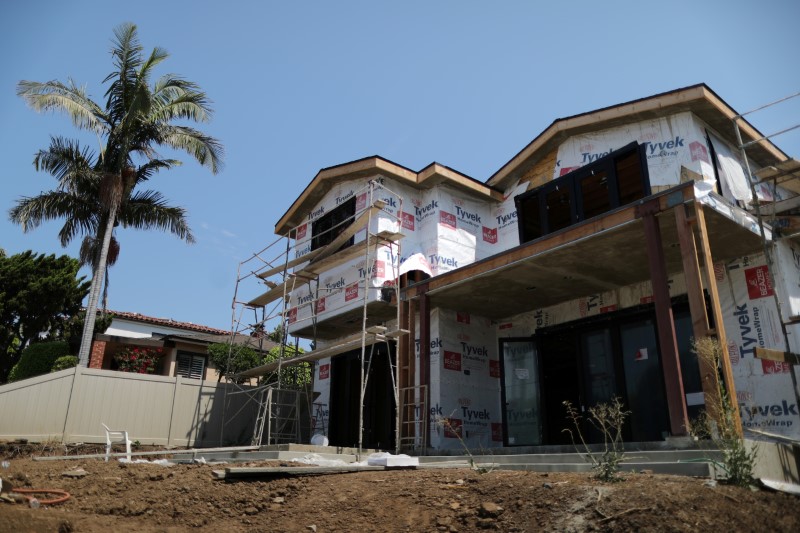By Lucia Mutikani
WASHINGTON (Reuters) - U.S. home sales surged to a 13-year high in February, but the housing market recovery is likely to be derailed by the coronavirus pandemic, which has unleashed a wave of layoffs and left the economy teetering on the brink of a recession.
The strong report from the National Association of Realtors on Friday reflected contracts signed in January and early February, before the highly contagious virus swept through the country, severely disrupting economic activity.
Economists are expecting a recession by the second quarter, but a growing number believe a downturn is already underway amid dire predictions of job losses at restaurants, bars, hotels and airlines. The government reported on Thursday that the number of Americans filing claims for unemployment benefits increased by the most since 2012 to a 2-1/2-year high last week.
Jobless claims could exceed 2 million next week, economists warned.
"All of that good news is strictly rear-view mirror now as America shelters in place with sales turnover set to tumble in the new recession starting right now," said Chris Rupkey, chief economist at MUFG in New York. "This is the fastest recession in history will suck down every sector of the economy even the housing sector that had been recovering."
Existing home sales jumped 6.5% to a seasonally adjusted annual rate of 5.77 million units last month, the highest level since February 2007, the NAR said. Economists polled by Reuters had forecast existing home sales would rise 0.7% to a rate of 5.50 million units in February.
Existing home sales, which make up about 90% of U.S. home sales, accelerated 7.2% on a year-on-year basis in February.
The housing market has regained its footing as mortgage rates have declined after hitting a soft patch beginning in the first quarter of 2018 through the second quarter of 2019.
Government data this week showed single-family homebuilding, which accounts for the largest share of the housing market, increased in February to the highest level since June 2007. Completions of single-family housing last month were the highest since December 2007, and the inventory of homes under construction rose to levels last seen in December 2006.
BUYER TRAFFIC SLOWING
These positive developments have been eclipsed by the coronavirus. The COVID-19 respiratory illness caused by the virus has killed at least 200 people in the United States and infected nearly 14,000 according to a Reuters tally.
State and local governments are enforcing "social distancing" policies aimed at containing the virus, which could significantly hamper the usually busy spring selling season.
The NAR noted that the coronavirus had "undoubtedly slowed buyer traffic," but expressed hope that the aggressive stimulus measures adopted by the Federal Reserve and being pursued by the U.S. government would support the housing market.
U.S. stocks were trading higher as intervention by U.S. policymakers finally seemed to stem the recent bleeding on Wall Street. The dollar (DXY) fell against a basket of currencies, while prices of U.S. Treasuries rose.
"We expect buyer traffic came to a virtual standstill starting last weekend," said Conrad DeQuadros, senior economic advisor at Brean Capital in New York. "In any case, it is likely extremely difficult to close on a sale at this point."
The NAR said it was difficult to predict the short-term effects of the coronavirus on future sales. Economists, however, anticipated a sharp decline in sales and possibly home prices, citing previous recessions.
"Since mortgage agreements effectively constrain many homeowners from selling properties at a loss, sellers must delay any planned sale until the economy recovers," said Kwame Donaldson, a senior economist at Moody's Analytics in West Chester, Pennsylvania. "This all translates into a steep decline in existing home sales during recessions."
Home sales last month rose 0.8% in the Midwest and jumped 7.2% in the populous South. They vaulted 18.9% in the West, which is the most expensive region, but fell 4.1% in the Northeast. There were 1.47 million previously owned homes on the market in February, down 9.8% from a year ago.
The median existing house price increased 8.0% from a year ago to $270,100 in February.
At February's sales pace, it would take 3.1 months to exhaust the current inventory unchanged from January and down from 3.6 months a year ago. A six-to-seven-month supply is viewed as a healthy balance between supply and demand.

Last month, houses for sale typically stayed on the market for 36 days, down from 43 days in January, and 44 days a year ago. Forty-seven percent of homes sold in February were on the market for less than a month. First-time buyers accounted for 32% of sales last month, matching January.
